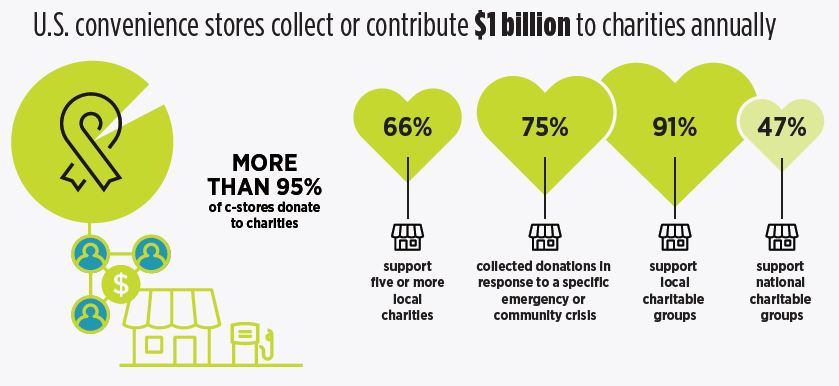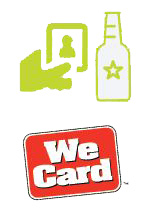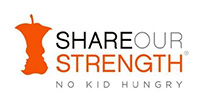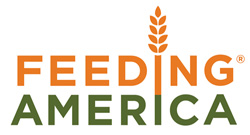C-Stores Are Community Stores
From sponsoring youth sports teams to conducting food drives, convenience stores strengthen the communities they serve, contributing more than $1 billion a year to charitable and community groups.
Nearly every convenience retail company (95%) supports charitable causes, with 66% supporting five or more charitable causes, according to a NACS member survey. Nearly all companies support local charities (91%), such as church groups, shelters, food banks and other non-sports groups, and approximately half of all retailers (47%) also support national charities. In addition, more than three in four retailers (76%) contribute to youth sports groups and more than two thirds (69%) contribute to local schools via PTAs and other fundraising activities.

For more than 35 years, convenience stores have been engaging employees and customers in campaigns to support local children’s hospitals throughout the United States and Canada. Companies have partnered with Children’s Miracle Network (CMN) Hospitals and have raised more than $250 million since the founding of CMN Hospitals in 1983.
Because c-stores have longer hours of operation, public restrooms and ease of access, this increases the likelihood that employees are in a unique position to help customers in need of a safe haven. While individuals in need of help can appear in any community or location, truck stops, travel centers and gas stations near highways tend to see frequent use by traffickers and their victims. Organizations and agencies can train store employees to identify and help victims of human trafficking.
The U.S. Department of Homeland Security’s (DHS) Blue Campaign created NACS-branded training and awareness materials for download, including posters, handouts and other materials, free of charge. These materials provide victims with phone numbers they can call to get help.
One organization that works closely with convenience retailers on human trafficking issues is Convenience Stores Against Trafficking (CSAT), a program of the national nonprofit In Our Backyard. CSAT raises public awareness, safely reaches out to victims and trains store employees to recognize and report trafficking. NACS and several state associations partner with the organization to offer free training and freedom stickers that list a phone number victims can call for help.
NACS also works with National Safe Place, an organization to help youth (under 21) in peril. Safe Place provides professional training to employees to identify and aid children who seek assistance. In tandem with school and community awareness programs, a store would display signage to alert those in need that the store is a designated Safe Place.
 Convenience stores are responsible retailers in the community, creating store-level sales practices for “age-sensitive products” like tobacco and alcohol. The industry helped create and adopt the use of the We Card tobacco training curriculum and the Techniques of Alcohol Management sales training curriculum.
Convenience stores are responsible retailers in the community, creating store-level sales practices for “age-sensitive products” like tobacco and alcohol. The industry helped create and adopt the use of the We Card tobacco training curriculum and the Techniques of Alcohol Management sales training curriculum.
The industry embraces responsible sales training, conducting 4.5 million ID checks for age-restricted products every day. In May 2021, NACS announced TruAge, which makes the traditional carding experience more convenient and accurate. TruAge addresses age-verification beyond the traditional store register to online ordering, home delivery and curbside pickup.
 One of the ways convenience stores can manage food waste is by establishing food donation programs within their company.
One of the ways convenience stores can manage food waste is by establishing food donation programs within their company.
NACS works with the Share Our Strength’s No Kid Hungry campaign (nokidhungry.org), which seeks to ensure that all children receive the healthy food they need by working within schools and with childcare organizations to create behavioral changes and provide meals.
 Many retailers also work with Feeding America (feedingamerica.org), the nation’s largest domestic hunger-relief organization that partners with food banks across the U.S. to collect food to be distributed by community agencies. The partnership was highlighted in a 2018 NACS Magazine feature, “Feeding the Community.”
Many retailers also work with Feeding America (feedingamerica.org), the nation’s largest domestic hunger-relief organization that partners with food banks across the U.S. to collect food to be distributed by community agencies. The partnership was highlighted in a 2018 NACS Magazine feature, “Feeding the Community.”
 When most community residents are evacuating to safety, convenience stores typically remain in operation as long possible without putting their own employees’ safety and well-being in harm’s way. Their focus is also to be the first to reopen when it is safe to do so. This means making sure fuel, food and other necessities are available for emergency workers and customers seeking a return to normalcy.
When most community residents are evacuating to safety, convenience stores typically remain in operation as long possible without putting their own employees’ safety and well-being in harm’s way. Their focus is also to be the first to reopen when it is safe to do so. This means making sure fuel, food and other necessities are available for emergency workers and customers seeking a return to normalcy.
In areas affected by disasters, stores with generators may serve as the only source of electricity to recharge phones, access ATMs and keep fuel dispensers operational for first responders.
In 2017, NACS became the first retail-focused association to partner with the American Red Cross to advance community giving in stores and assist in disaster recovery efforts. C-stores are in every community and often the only business open in times of an episodic event, able to provide food and fuel to those in need.
In 2019, NACS developed a set of emergency planning resources with the U.S. Department of Homeland Security and FEMA experts to help retailers boost their business’s resiliency as they plan, prepare and recover from a disaster.